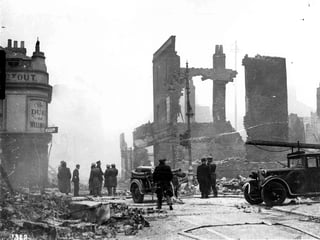Blitz survivors remember devastation 80 years on from most brutal raid as Portsmouth marks occasion
and live on Freeview channel 276
‘The bomb blew the pub next door into bits killing six people. We would have been blown to bits too if he had hit us.
‘Most of our house was ruined and all we could see was rubble and bits of wood. My mum, dad and us five kids were all frightened to death.
‘I am grateful to still be here.’
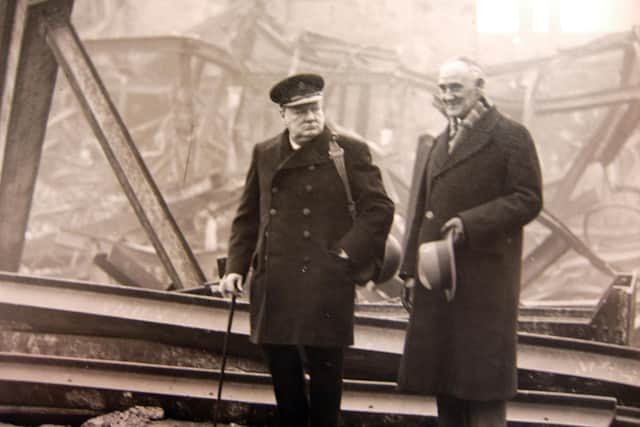

Advertisement
Hide AdAdvertisement
Hide AdDerek Little, now 86, was aged six at the time of the most devastating Blitz attacks on the city on January 10-11, 1941, during the Second World War.
Despite his early years, the memories remain imprinted on his mind as the 80-year anniversary of those fateful raids - the most brutal of the lightning attacks on Portsmouth - are marked this weekend.
During the Nazi onslaught, which saw thousands of bombs dropped between 5pm on January 10, 1941, and into the early hours of January 11, large parts of the city were transformed into ‘smoking ruins’.
The blitzkrieg attack saw 172 people killed and hundreds more injured or made homeless during the city’s darkest hour.


Advertisement
Hide AdAdvertisement
Hide AdOverall during the Blitz, 930 people were killed in Portsmouth and 2,837 were injured. More than 6,000 properties were destroyed.
Despite not being able to hold a traditional-style event amid the latest coronavirus lockdown, Portsmouth City Council has arranged several digital activities to mark the occasion and offer a glimpse into what it was like for survivors like Derek at the time.
These include developing an interactive map allowing residents to see exactly where all of the bombs during the Blitz landed in and around the city.
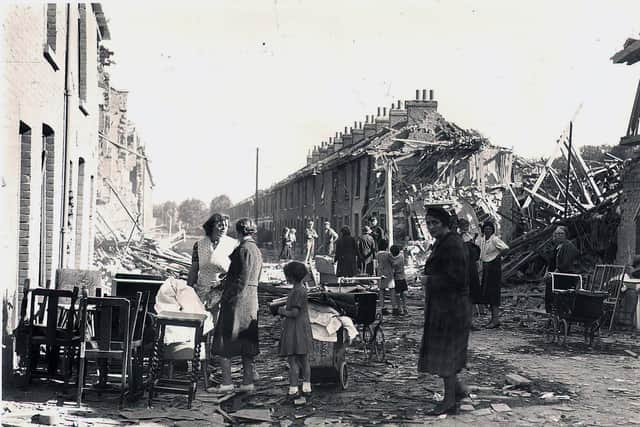

Entries from the air raid controller’s log book from the night of January 10-11 will be posted on social media at the exact time that they happened along with and eyewitness accounts.
Advertisement
Hide AdAdvertisement
Hide Ad‘I will have a few drinks and a moment of a reflection with my partner,’ Derek, of Milton said.
The mudlarker, who had to be moved from his Clock Street house after the Bedford in Chase pub was blown up, remembered Portsea was left devastated after the raids.
‘My older brother took me to The Hard to see the devastation...you wouldn’t believe it,’ he said.
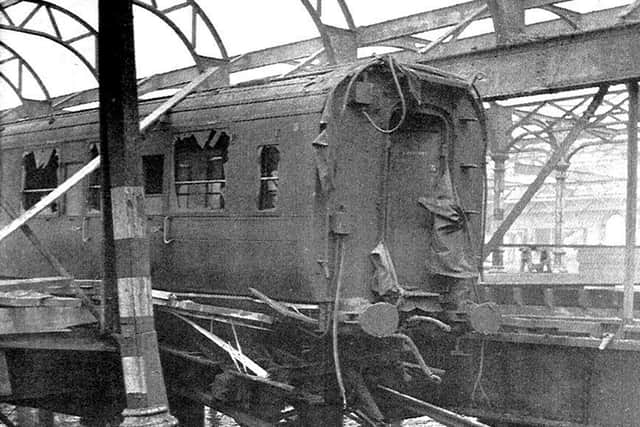

‘I was only a nipper and had never seen a dead body before. The raid left an indelible print on my mind.
Advertisement
Hide AdAdvertisement
Hide Ad‘We were lucky to get away with it. The area was totally devastated and our house was shattered from the blast. A lot of people got wiped away.
‘I will never forget it. Never.’
Jill Taylor, 85, of Purbrook, was five at the time of the raid, said: ‘I remember not being worried. We would sleep in the air raid shelters every night and hear sirens. To us it was normal life...we didn’t sit there thinking how dreadful it was.
‘We just accepted the devastation. After the raids we played on the bomb sites...climbing on the rubble and throwing bricks at each other.
‘The father of one of my friends from school was killed in the raids. She was chosen, along with other orphans, to present a bouquet to the king and queen and two young princes after they docked at Portsmouth.’
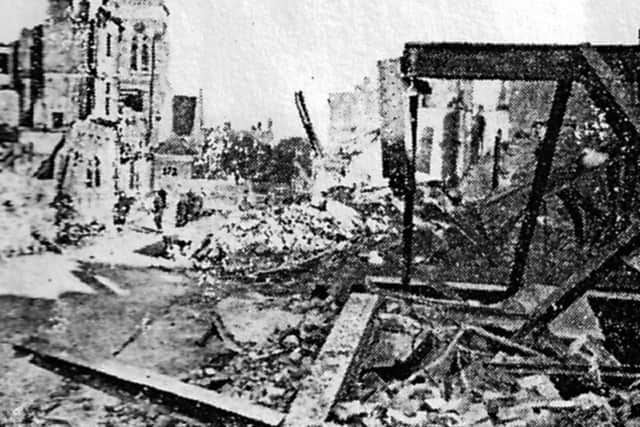

Advertisement
Hide AdAdvertisement
Hide AdJean Louth, 87, of West Leigh, lived in Stamshaw during the attack. ‘We were very lucky not to have our house bombed… my aunt had her window blown out,’ she said.
‘I remember a huge rocket landed in Locksway Road near the hospital. It was horrific.
‘Other people were left absolutely devastated after having their houses bombed and things strewn everywhere.’
Jean, who spent 27 years successfully campaigning for a memorial to civilians killed in the Blitz in the city, added: ‘As kids we were not scared, it all seemed quite exciting during the day. At night time it was frightening, though.’
Advertisement
Hide AdAdvertisement
Hide AdSheila Duce lived in Eastney during the raid. She said: ‘You heard the screaming of the bombs coming down and the awful explosions, and you were just so thankful you know, that it wasn't on top of us.’
George Jeffery, 87, still vividly remembers the moment the German bombers were approaching the harbour. ‘I remember us saying “look up here they come” as 100 German bombers came in over the sea,’ he said. ‘But we didn’t get scared, which just dived inside for cover.
SEE ALSO: Glimpse into Blitz air raid
‘Hours after the raid we could hear the rumble of the last German bombers in the distant sky. When we looked around, our house and countless others had disappeared. There were no homes for anyone to go to.’
John Stedman, records manager at Portsmouth History Centre and author of Portsmouth Reborn: Destruction and Reconstruction 1939-1974, said: ‘The bombing on the night of January 10/11, 1941, was Portsmouth's grimmest experience in a long and terrible war, changing the face of the city dramatically and suddenly.
Advertisement
Hide AdAdvertisement
Hide Ad‘The survivors found large parts of Portsea, Landport and Southsea were smoking ruins. The Guildhall, six churches, a hospital, three cinemas and most of the Commercial Road, King's Road and Palmerston Road shopping centres were all damaged by the raid.’
Politicians mark anniversary
Other activities to mark the 80 year anniversary will include a video from the Lord Mayor of Portsmouth, councillor Rob Wood, who will be reciting the message shared by his predecessor Sir Denis Daley shortly after the raid.
In his message, Sir Denis said: ‘We are bruised, but we are not daunted, and we are still as determined as ever to stand side by side with other cities who have felt the blast of the enemy, and we shall, with them, persevere with an unflagging spirit towards a conclusive and decisive victory.’
Councillor Steve Pitt, deputy leader of the council, said: ‘This is a very different anniversary to the kind we have had in previous years, but we felt it important to reflect and remember a very significant event in the city's history; especially with the current restrictions and ongoing impact of Covid-19.
Advertisement
Hide AdAdvertisement
Hide Ad‘The eyewitness accounts and log book entries for the evening provide an insight into the timeline of the air raid, but it is the interactive map and the extensive locations of bomb sites between 1941 and 1944 that is so startling.’
The council also hopes to illuminate the clock tower of the Guildhall - one of the few parts of the building to remain standing after the raid.
Activities to mark the 80th anniversary of the air raid will be shared on Portsmouth City Museum and Portsmouth Libraries Facebook and Twitter feeds.
Residents wanting to explore the sites where the bombs fell are encouraged to do so safely within current Covid-19 restrictions.
A message from the Editor, Mark Waldron
You can subscribe here for unlimited access to Portsmouth news online - as well as fewer adverts, access to our digital edition and mobile app.
Our trial offer starts at just £2 a month for the first two months.
Comment Guidelines
National World encourages reader discussion on our stories. User feedback, insights and back-and-forth exchanges add a rich layer of context to reporting. Please review our Community Guidelines before commenting.
